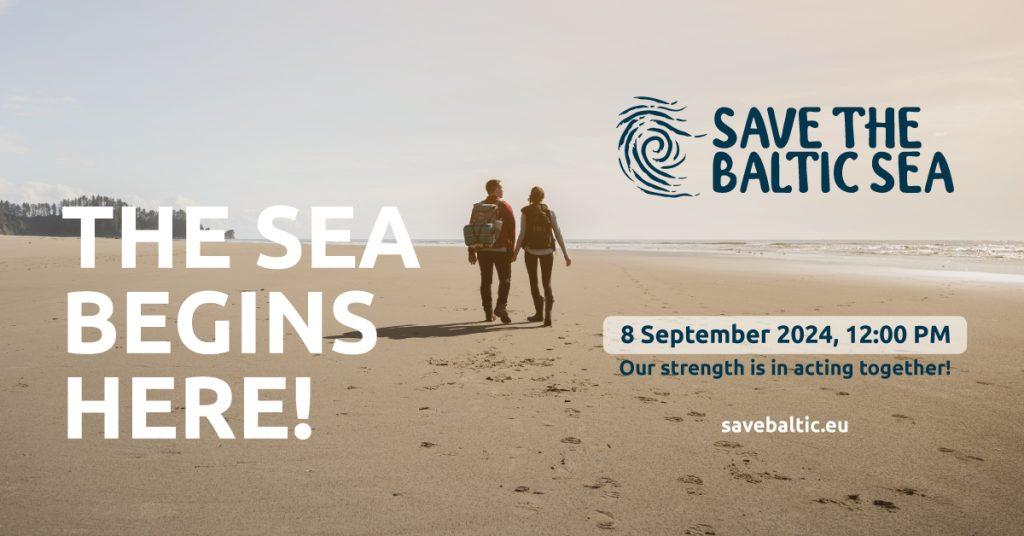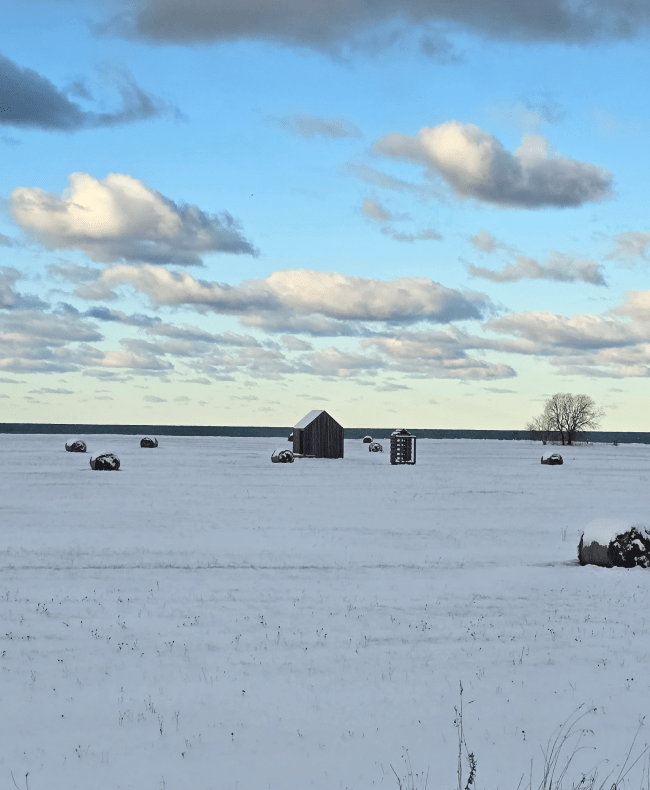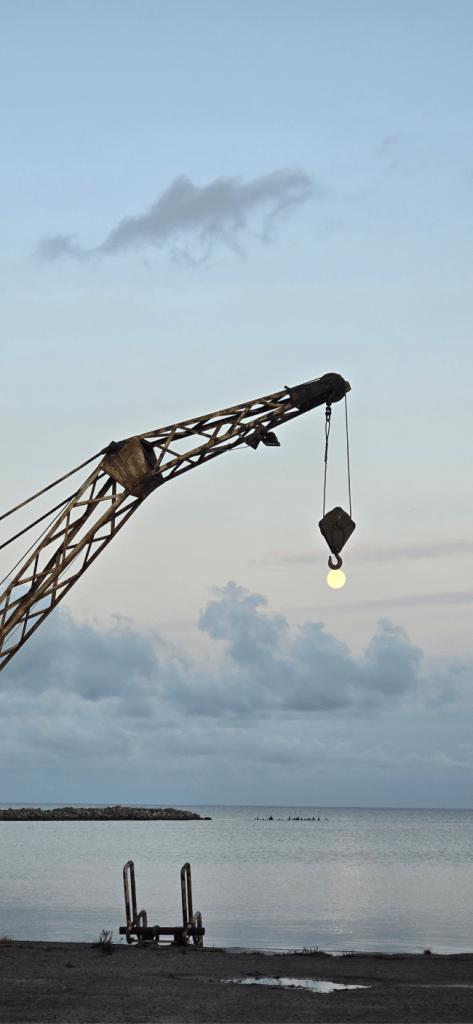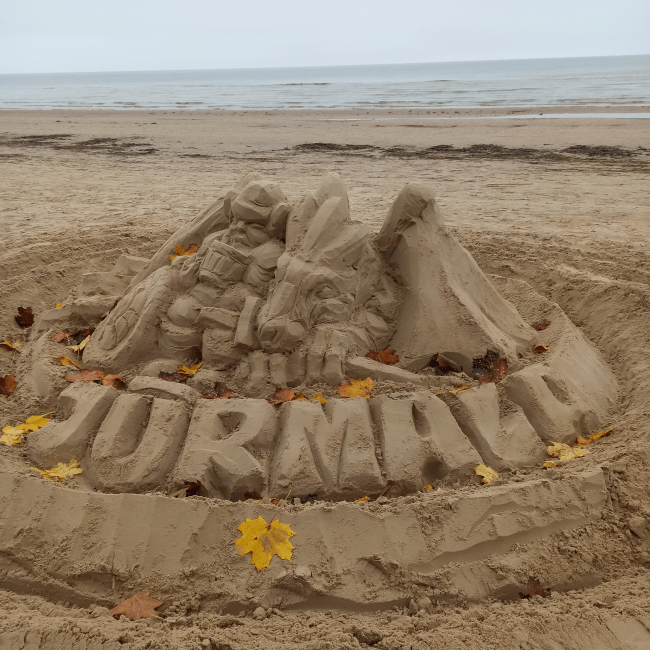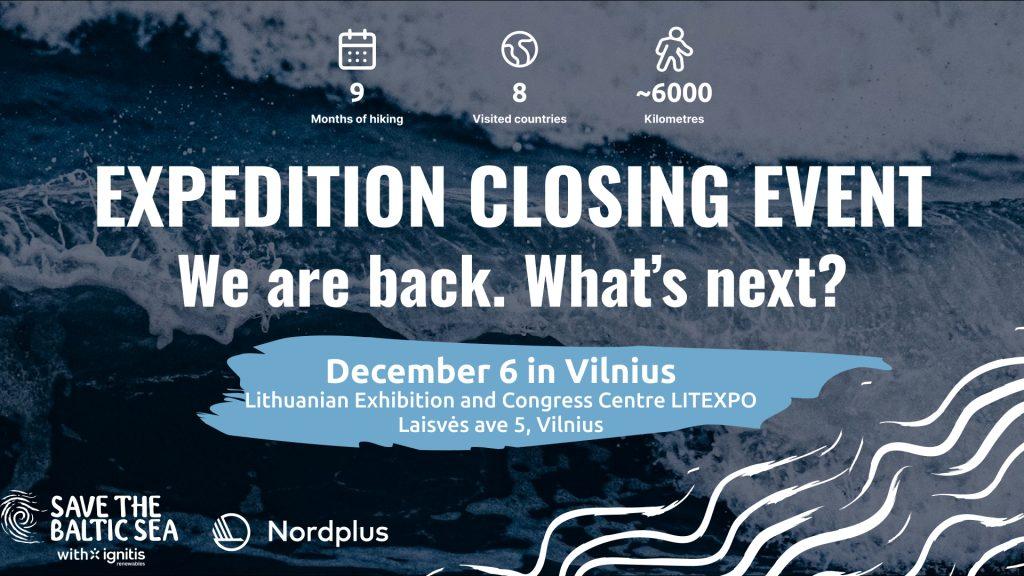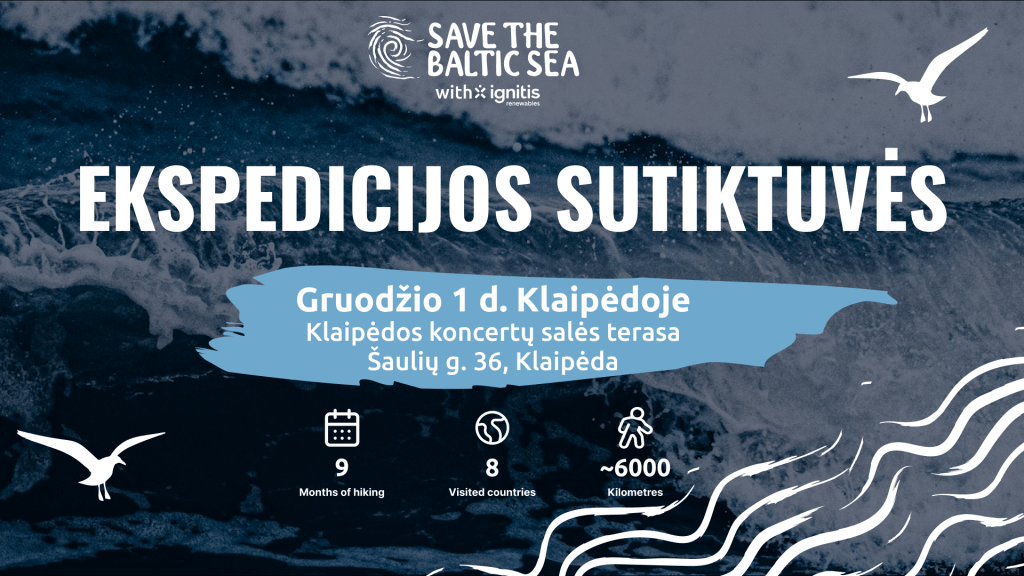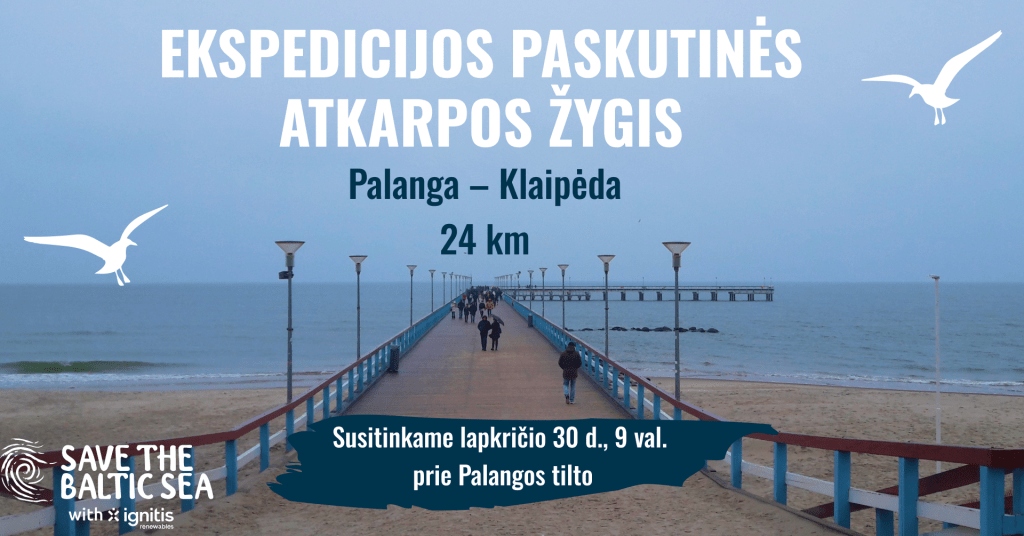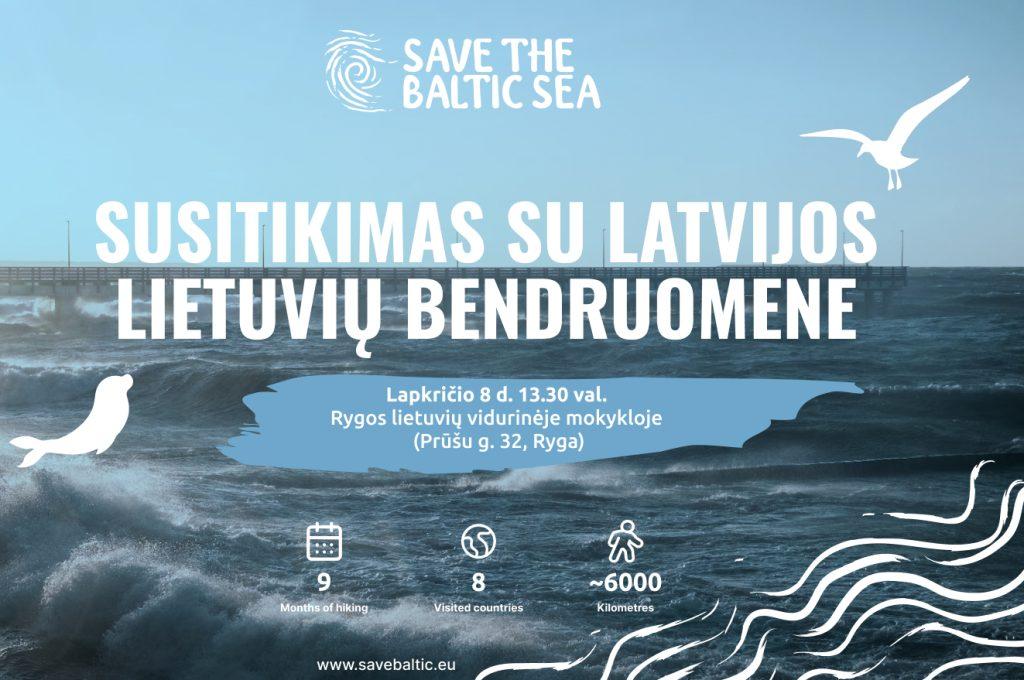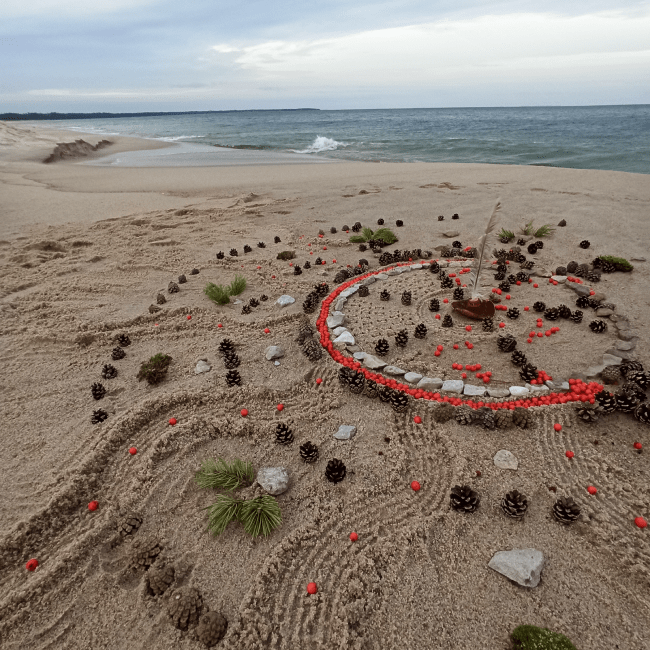WEEK 34. IT’S ALL IN YOUR HEAD, OR EVERY ENDING IS THE NEW BEGINNING
Nov. 04, 2024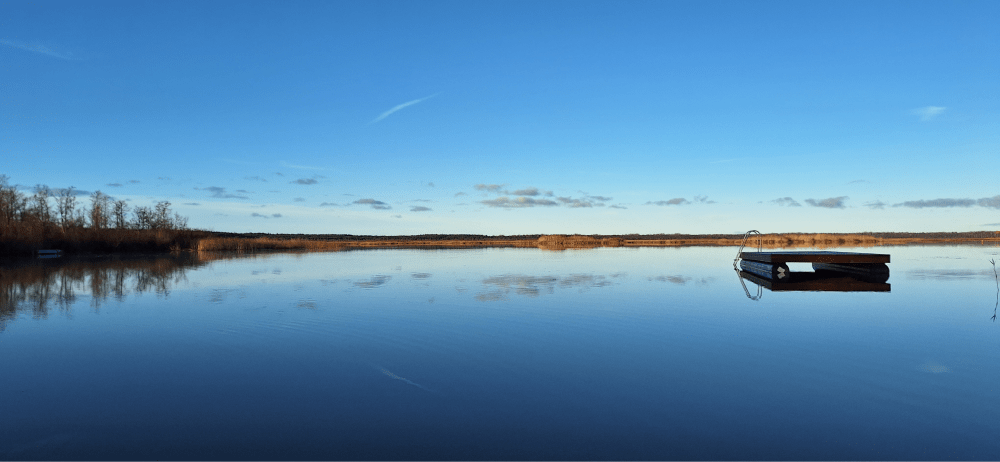
I’m writing my last weekly blog with rain pouring down outside and the autumn landscape rolling past the bus window under a cloudy sky. I must come back to Lithuania for some time in order to join the final kilometers of the expedition at the end of November. I left with a whole sea of emotions within me. I keep wondering what the team is doing now, and each message from them brings me so much happiness. I can’t help thinking of them—we spent a full month together, filled with so many experiences. The range of emotions was vast, spanning from euphoria and joy to melancholy, sadness, and even tears.
Only a month has passed, but the feeling is as if I’ve been pulled from my own life—a life that felt truer, purer, and more meaningful. A life where you could just live simply and find joy in the basics: in hiking, in the beauty of nature, meeting new people, attending events, savoring food made by Edita and the gratitude ritual before each meal, finding a bed and, if lucky, a shower, sharing conversations, and taking care of each other.
I hold back my tears because I know once I start crying, I will not be able to stop soon. So I write and plan my further work.
As I try to recall the 34th week of the expedition, I remember it as uniquely special, just like all expedition weeks I have experienced. It began with a warm morning spent at a hospitable woman’s house, and a breakfast prepared especially for us in a room that felt like a grandmother’s countryside living room.
After sending Dovilė and Giedrius off, Edita and I got down to work and headed toward our next accommodation. Along the way, we spotted the hikers with about 8 km left to go, so I decided to join them. Since the path was clear and straight, Dovilė and I came up with a trust game: one of us would walk with her eyes closed while the other led. It was quite a challenge for the brain, as you felt you were constantly about to bump into something or trip, but you had to rely completely on the person guiding you.
We arrived at an amazing spot—a newly furnished house right on the seafront! Hosted once again free of charge by the Topu Sadam Fishermen’s Association, we couldn’t have asked for better accommodations. The house has a spacious lounge, a kitchen, and two upstairs bedrooms. The caretaker was an absolute burst of positive energy, stopped by for a quick chat and brought us several kinds of bread and fish. She instantly showed us how to gut marinated sprats and make a popular Estonian dish: sandwiches with bread, butter, eggs, and sprats.
With such a great kitchen at hand, I decided to treat the team to honey cookies, keeping with our Estonian rule of minimizing added sugar. Meanwhile, Giedrius found time to present the expedition to students in a remote meeting at Klaipėda’s I. Kant Library.
The next day was a rest day, as our next accommodation stop was only 5 km away—a distance covered by three of us: Dovilė, Edita, and I. This time, we were staying at a countryside library and community center, complete with a kitchen, showers, and a hall with a stage. We can now officially say we’ve slept in the most unusual places—even on a stage! Our sleeping spots were set up on mattresses placed right on it.
That evening, we had a meeting with the local community. Though only a few people and a journalist from the local paper attended, it was a nice and cozy gathering, giving us a chance to really connect with those present. It turned out that those who came were deeply committed to nature and their environment. One woman shared that she moved to the countryside for her children, wanting them to grow up away from the city and its polluted air. She consciously avoids driving, choosing to walk or bike everywhere, and hasn’t regretted this choice, even though it can be challenging, especially with limited public transport for trips to the city.
The local community seemed really dedicated to healthy living and sustainability. They generously gave us gifts of organic porridge, homemade canned goods, condiments, and fresh bread.
The next day, Giedrius and I hiked mostly along country roads, pastures, and through small villages. It was the last week before All Souls’ Day, and the reflective, philosophical mood seems to hang in the air more often.
Along the way, we stumbled upon the grave of Cyrillus Kreek, an Estonian composer from the early 20th century. Kreek collected religious folk songs from the Haapsalu region and was the first in Estonia to use a phonograph for recording. Later, we came across a 15th-century church and the cemetery beside it, though, unfortunately, we couldn’t go inside the church.
We didn’t encounter any people along the way, but we did meet some beautiful horses in a pasture, including a mare with her foal. We offered them apples, and I had the “luck” of accidentally touching the electric fence, which gave both the horse and me quite a shock!
At night we stayed at the Roude Community Museum, a building with a library, several rooms, and a large, old kitchen from the soviet times. The place had a somber feel, reminiscent of a soviet-era kindergarten, but the walls inside were decorated with cute little things. Among them was a woven Christmas tree, cards and posters with quotes. One quote especially resonated with me—the words of Buddha in Estonian: “Me oleme mida mõtleme. Kõik, mis me oleme, tekib meie mõtetest. Oma mõtetega loome oma maailma.” Translated, it reads: “We are what we think. All that we are arises with our thoughts. With our thoughts, we make the world.” Or, as Giedrius would say: ‘It’s all in your head.’ I can’t argue with that.
In the evening, Edita and I stepped outside before bed. We talked and gazed up at the clear, star-filled sky, and the longer we looked, the closer the stars seemed to draw, as if they were coming toward us. Under such an immense sky, I felt so small, insignificant and lonely. For me, the starry sky is a direct reminder to stay humble: “Don’t get too self-important, just do what needs to be done.”
The next morning, we said goodbye to Giedrius and Dovilė and got to work. In the afternoon we moved on to our next place to stay—the village school. We were welcomed by one of the students’ mothers. We told her about the expedition and the problems of the Baltic Sea. She admitted that sustainability isn’t her top concern, but she proudly mentioned that she doesn’t use cosmetics and grows her vegetables naturally. As I noticed that living in the countryside, people are often closer to nature compared with city people, so some kind of sustainability seems to come naturally.
The school itself was small, with just a few classrooms, a kitchen, a canteen, and an art room, all centered around a large wood-burning stove. While waiting for the hikers, Edita and I brought in our belongings and prepared dinner. That night, we slept on the floor in the hall.
The next morning, Giedrius and I set off again. First, it rained, then the wind began to pick up. Our route led us through a horse farm, where we stopped for a snack and watched riders on an obstacle course. We shared a bit about our expedition with one of the riders before continuing on through vast pastures observing horses, cows, oxen, and even yaks.
The road wound through juniper woodlands toward the Nehatu Nature Reserve, established in 1957 to protect the reedbeds and mires of current and previous sea lagoons and migrating and breeding waterfowl and waders. Looking for a good spot for lunch, we were happily surprised when Edita and Dovilė caught up to us in their bus. It was our first time to enjoy lunch together.
Afterward, Edita and Dovilė hurried ahead to scout a place for us to stay at night, while Giedrius and I continued hiking. Accommodation was tricky to find, so we also began searching and calling and even stopping in backyards of people to ask if anyone could offer a place for the night.
With no luck finding accommodations, we decided to skip one day of hiking and go 30 km by our van to an agreed place and have a day-off there. We stayed at a campsite on Lake Ermistu, the largest lake in Parnu County, with an average depth of just 1.3 meters. We spent the day working on our computers—that’s what our “days off” look like. I noticed the weariness on my team friends’ faces, and I had to remind myself to stay strong, as it was only my fifth week of expedition, which is nothing compared to the four to seven months.
While finishing this weekly blog, I sadly glanced at my backpack casually dropped by the bed with a flag bearing the words “Save the Baltic Sea.” I once thanked Giedrius, telling him that this idea of his had grown beyond him and it had already touched the hearts of so many people. Talking about myself, it lifted me up and made me feel like it is the beginning of my new path in life.
Hiker and Communication Coordinator (volunteer) Ieva
You are welcome to join the expedition “Save The Baltic Sea“ and hike together or become a volunteer. Write us an email: info@savebaltic.eu
Become a Baltic Sea hero and hike with us virtually by getting a Baltic Sea hero ticket: https://www.facebook.com/share/yCZDVHboSCdJX6fQ/
Find in the link below on how to support the expedition: https://savebaltic.eu/support/
Follow us on social media and get informed on how we are doing! You can also explore more about the Baltic Sea there:
Instagram: https://www.instagram.com/save.the.baltic.sea/
Facebook: https://www.facebook.com/SaveTheBalticSea
LinkedIn: https://www.linkedin.com/company/save-the-baltic-sea/
Website: https://savebaltic.eu
_________________________________________________________________________________________
34 EKSPEDICIJOS SAVAITĖ. VISKAS TAVO GALVOJE ARBA KIEKVIENA PABAIGA YRA KAŽKO NAUJO PRADŽIA
Rašau šį tekstą, už lango pliaupiant lietui, o pro autobuso langą lekiant įsibėgėjusio rudens vaizdams apniukusio dangaus fone. Išvykstu į Lietuvą, kad lapkričio pabaigoje vėl galėčiau prisijungti paskutiniams kilometrams. Viduje visa jūra banguojančių jausmų. Iš pradžių galvoju, ką dabar veikia komanda. Apsidžiaugiu, gavusi jų žinutes. Negaliu apie juos negalvoti, juk visą mėnesį praleidom kartu. Daug visko per jį nutiko. Spektras platus – nuo euforinio džiaugsmo iki melancholijos, liūdesio ir ašarų.
Atrodo, gi tik vienas mėnuo praėjo, o jausmas toks, tarsi kas būtų mane išplėšęs iš paties gyvenimo. Iš tikresnio, grynesnio, prasmingesnio gyvenimo. Tokio, kuriame tiesiog gyveni paprastai ir džiaugiesi paprastais dalykais: ėjimu, supančia gamta, sutiktais žmonėmis, renginiais, gražiau suregztu anglišku sakiniu, Editos pagamintu maistu ir padėkos ritualu prieš kiekvieną valgį, lova ir dušu (jeigu pasiseka tokius rasti), pokalbiais ir rūpesčiu vienas kitu.
Neleidžiu sau verkti, nes žinau, kad sustoti bus sunku. Todėl rašau, planuoju ir dėlioju tolimesnius darbus. Bandau prisiminti, kokia gi buvo toji 34-oji ekspedicijos savaitė? Man ji, kaip ir visos, buvo ypatinga. Prasidėjo rytu pas svetingąją moteriškę ir medžiotojus bei specialiai mums paruoštais pusryčiais kambaryje, kaip pas močiutę kaime.
Išlydėjusios Dovilę ir Giedrių į kelią, su Edita pasidarbavome ir išvažiavome link naujosios nakvynės vietos. Pakeliui pamatėme žygeivius, kuriems buvo likę apie 8 km, todėl aš nusprendžiau prisijungti prie jų. Kadangi kelias pakankamai aiškus ir tiesus, žygiuodamos su Dovile sugalvojome pasitikėjimo žaidimą – viena eina užsimerkusi, o kita veda. Po kelių kilometrų keičiamės. Smegenims tikras iššūkis, nes vis atrodo, kad į ką nors atsitrenksi ar užkliūsi, bet turi pasitikėti tave vedančiu žmogumi.
Atkeliavome į nuostabią vietą – naujai įrengtą namelį ant jūros kranto! Mus priėmė (ir vėl nemokamai!) Žvejų asociacija Topu Sadam regione. Namelyje didelis salonas ir virtuvė bei du kambariai antrame aukšte. Geriau ir būti negali! O jį prižiūrinti moteris – tikras geros energijos užtaisas. Ji užsuko trumpam mūsų aplankyti, pabendrauti bei atnešė gėrybių – kelių rūšių duonos ir žuvies. Nieko nelaukusi, parodė kaip išdarinėti marinuotus šprotus ir kaip su jais pasigaminti populiarųjį estų patiekalą — sumuštinius su duona, sviestu, kiaušiniais ir šprotais. Kadangi turėjome didelę ir gražią virtuvę, aš nusprendžiau pamaloninti komandos draugus ir iškepti sausainių su medumi, nes nuo Estijos laikomės taisyklės – kuo mažiau pridėtinio cukraus. O Giedrius dar spėjo pristatyti ekspediciją nuotoliniame susitikime Klaipėdos I. Kanto bibliotekoje susirinkusiems moksleiviams.
Kitą dieną, galima sakyti, turėjome laisvadienį, nes iki kitos nakvynės vietos vos 5 km, kuriuos nužygiavome trise – aš, Dovilė ir Edita. O toji vieta – kaimo biblioteka ir bendruomenės namai viename. Juose ir virtuvė, ir dušai bei salė su scena. Dabar jau tikrai galime pasigirti, kad miegojome pačiose netikėčiausiose vietose – net ant scenos! Tiksliau ant mums parūpintų čiužinių scenoje.
Vakare mūsų laukė susitikimas su bendruomene. Žmonių vos keli ir vietinio laikraščio žurnalistas. Gaila, kad mažai, bet kita vertus tokie susitikimai būna itin jaukūs, kadangi turėjom galimybę susipažinti ir daugiau vieni apie kitus sužinoti. Ir kaip vėliau paaiškėjo, atėjo būtent tie, kuriems tikrai rūpi gamta ir jų aplinka. Viena moteris sakėsi į kaimą persikėlusi dėl vaikų. Nenorėjo, kad jie augtų mieste ir kvėpuotų užterštu oru. Pati sąmoningai nevairuoja mašinos, visur vaikšto pėščiomis ar važiuoja dviračiu. Niekada šio sprendimo nesigailėjo, nors kartais toks pasirinkimas ir kelia iššūkių, nes viešasis transportas išvystytas neblogai, tačiau vis tiek tenka įdėti pastangų planuojant tolimesnę kelionę į miestą.
Panašu, kad bendruomenė laikosi sveikos gyvensenos ir tvarumo principų, nes gavome dovanų ekologiškų grūdų košių, konservuotų gėrybių ir pagardų bei naminės duonos.
Kitą dieną jau žygiavome su Giedriumi daugiausia laukų keliais, ganyklomis, pro mažus miestelius. Paskutinė savaitė prieš Vėlines ir tai jaučiasi, nes vis dažniau aplanko tokia egzistencinė filosofinė nuotaika.
Pakeliui aptikome XX a. pradžios estų kompozitoriaus Cyrillus Kreek kapą. Jis rinko religines liaudies dainas Haapsalu regione ir šiam tikslui pirmasis Estijoje panaudojo fonografą. Vėliau miestelyje apžiūrėjome XV a. bažnyčią ir kapines šalia jos. Į bažnyčios vidų, deja, nepatekome.
Žmonių kely nesutikome, bet užtat sutikome gražuolių arklių ganykloje, tarp jų ir kumelė su kumeliuku. Pavaišinome juos obuoliais, o man „pasisekė“ netyčia prisiliesti prie elektrinio piemens. Gerokai išsigandom abu – ir aš, ir arklys.
Apsistojome Roude bendruomenės muziejuje, kuriame įsikūrusi biblioteka, įrengti keli kambariai, didelė sena nuo sovietinių laikų užsilikusi virtuvė. Pats pastatas niūrus ir priminė galimai sovietiniais laikais veikusį vaikų darželį. Užtat ant sienų – visokių įdomybių. Pavyzdžiui, austa kalėdinė eglutė, visokių atvirukų, palinkėjimų, o viena ant paprasto lapelio užrašyta frazė man ypač patiko – Budos žodžiai estiškai: „Me oleme mida mõtleme. Kõik, mis me oleme, tekib meie mõtetest. Oma mõtetega loome oma maailma.” Išvertus į lietuvių kalbą: „Esame tai, ką galvojame. Viskas, kas mes esame, kyla iš mūsų minčių. Mes kuriame pasaulį savo mintimis.“ Arba, kaip Giedrius pasakytų: „Viskas tavo galvoje“. Šįkart negaliu ginčytis.
Vakare prieš miegą su Edita dar išeiname į lauką. Besišnekučiuodamos įsispoksome į giedrą žvaigždžių nusėtą dangų ir kuo ilgiau žiūri, tuo labiau rodosi, kad žvaigždžių vis daugėja ir daugėja, jos vis artėja ir artėja. Nori nenori prieš tokią neaprėpiamybę pasijunti toks mažas, nereikšmingas, gal kartais nereikalingas ir vienišas. Žvaigždėtas dangus man tarsi tiesioginis paprastumo priminimas „Nesusireikšmink per daug, o daryk, ką turi padaryti!“
Kitą rytą išlydim Giedrių su Dovile ir sėdam prie darbų, o popiet pajudam jau link kitos nakvynės vietos – kaimo mokyklos. Mus pasitinka vieno iš mokinių mama, kuriai papasakojam apie ekspediciją, Baltijos jūros problemas, bet ji prisipažįsta, kad tvarumo dalykai jos nelabai jaudina, bet vistiek pasigiria, kad kosmetikos nenaudojanti ir natūraliai auginanti daržoves. Kaip ten bebūtų, svarstau, kad kaime žmonės labiau susigyvenę su gamta, todėl jiems tas natūralumas tarsi savaime išeina.
Mokykla nedidukė, vos kelios klasės, virtuvė, valgyklėlė ir dailės kabinetas viename su dideliu malkiniu pečiumi. Belaukdamos žygeivių, su Edita sunešėme daiktus ir gaminome vakarienę. Naktis šįkart salėje ant grindų.
Kitą rytą vėl išėjome į kelią su Giedriumi. Iš pradžių lynojo, paskui pakilo vėjas. Maršrutas vingiavo per žirgyną, kuriame sustojome užkąsti, o tuo pačiu stebėjome jojimo treniruotę su kliūtimis. Vienai iš jojikių papasakojom apie ekspediciją. Toliau keliavome per didžiules arklių, karvių, jaučių ir jakų ganyklas.
Kelias pasisuko pro kadagynais apaugusias pakeles link Nehatu gamtos rezervato, įsteigto 1957 m. siekiant apsaugoti jūros įlankų nendrynus ir pelkes, migruojančius ir perinčius vandens paukščius (antis ir žąsis) bei tilvikus. Besidairant patogesnės vietelės pietums, ištiko malonus netikėtumas – mus busiuku prisivijo Edita su Dovile. Tad pirmąkart pietavome visi kartu.
Po pietų Edita su Dovile nuskubėjo ieškoti nakvynės, o mes su Giedrium patraukėm toliau. Su nakvyne sekėsi sunkiai, todėl eidami taip pat ėmėmės paieškų, skambindami į įvairias vietas bei užsukdami tiesiog pas žmones į kiemus ir klausinėdami, gal jie turi ką pasiūlyti. Nieko nepešę, nutarėme visi pavažiuoti su busu apie 30 km toliau nuo planuotos vietos ir praleidus vieną žygiavimo dieną, pasidaryti laisvadienį.
Apsistojome kempinge prie didžiausio ežero Parnu apskrityje – Ermistu, kurio vidutinis gylis tik 1,3 m. Taigi vieną dieną praleidom visi kartu besidarbuodami prie kompiuterių. Tokie jau tie mūsų laisvadieniai. Pastebiu didelį nuovargį komandos narių veiduose ir bandau susiimti, nes man tik 5-oji savaitė prasidėjo, o tai yra lašas jūroje palyginus su keturiais ar septyniais ekspedicijos mėnesiais.
Savaitraštį baigiu rašyti jau iš namų, žvelgdama į atsainiai numestą žygio kuprinę prie lovos, ant kurios puikuojasi vėliavėlė su užrašu: Save The Baltic Sea. Kartą dėkodama sakiau Giedriui, kad šis jo sumanymas tapo daugiau už jį patį ta prasme, kad palietė ne vieno žmogaus gyvenimą. Ne tik palietė, bet ir kilstelėjo nuo žemės, jeigu taip galima pasakyti. Bent manąjį tai tikrai, nes jaučiu, kad tai naujo kelio pradžia. Nekantrauju sužinoti, kur jis nuves!
Žygeivė ir komunikacijos koordinatorė (savanorė) Ieva
Ekspedicija „Išsaugokime Baltiją“ kviečia jungtis ir pažygiuoti kartu aplink Baltijos jūrą. Norėdami prisijungti, parašykite el. paštu: info@savebaltic.eu
Taip pat kviečiame prisidėti prie ekspedicijos finansiškai ar savanoriška veikla, padedant pasiekti kuo daugiau žmonių. Kaip tai padaryti, rasite čia: https://savebaltic.eu/support/
Dėl savanorystės rašykite el. paštu: info@savebaltic.eu
Sekite ekspedicijos naujienas soc. medijose:
Instagram paskyra: https://www.instagram.com/save.the.baltic.sea/
Facebook paskyra: https://www.facebook.com/SaveTheBalticSea
Linkedin: https://www.linkedin.com/company/save-the-baltic-sea/
Ekspedicijos internetinis puslapis: https://savebaltic.eu
Ekspedicijos skiltis informacinio partnerio DELFI platformoje: https://www.delfi.lt/multimedija/issaugokime-baltija/
